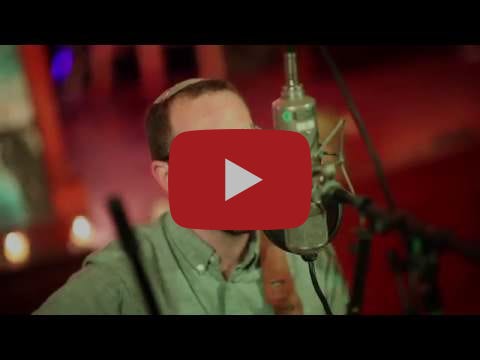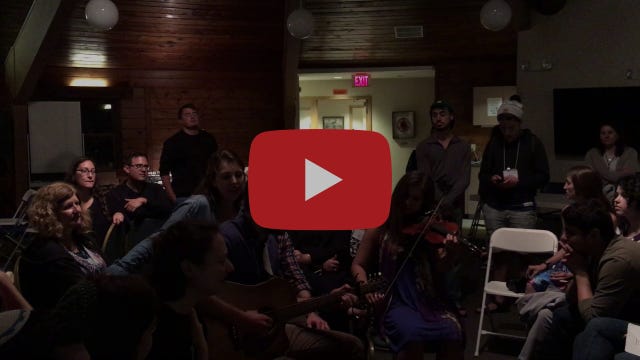The Song of the Future: Beshalach 5783
Beshalach 5783

Va'ani Ashir Uzecha
Rabbi Josh Warshawsky and the Chaverai Nevarech Band
The Song of the Future.
How do we know what events will be remembered? What will go down in history as something extraordinary? Something life-changing? Living in the present, we can never know if an event will stand the test of time. Unless, of course, that event is the splitting of the Red Sea. An event so monumental that even as it was happening, it was as if it was already recorded in the annals of history.
Rav Akiva Eiger (Early 19th Century Rabbinic leader in Hungary) noticed that when Moses sings the Song of the Sea after the people of Israel cross to freedom, the verse is written in future tense, “Az Yashir,” “And he will sing,” as opposed to “Az Shar,” “And he sang.” Rav Akiva notes that the only way a historic event is truly remembered and known in the future is if the story is sung out. There is a story of the splitting of the sea and the People of Israel crossing in the book of Joshua as well, but it has been almost forgotten in comparison to this crossing out of Egypt. Why? Because this sea-crossing is retold in song! “And the women dancing with their timbrels followed Miriam as she sang her song…” “Mi Chamocha Ba’Eilim Adonai?!” “Who is like you, O God?!” These are words we sing every day in our prayers and remember this moment. To sing is to publicize, to share.
Perhaps the most familiar line from the Song of the Sea is “Ozi v’zimrat Yah vayehi li li’yeshua,” “God is my strength and my song, and God will be my salvation.” There is a midrash (story/explanation – exegesis) from Shir Hashirim Rabbah (Exegesis from the Song of Songs) that expands these words in such a powerful way. Shir Hashirim Rabbah is filled with parables of royalty and their relations with various people in the kingdom. In this particular midrash, a royal ruler has in their possession many precious jewels and stones; rubies and emeralds, diamonds and gold. The ruler’s child approaches them and says, “My parent, let me have those.” And the ruler says, “They’re yours, they’ve always been yours, and to you I give them.”
The rabbis liken this parable to the people of Israel as they stand at the shore of the Red Sea before it has been split. The Egyptians are at their backs and they are frightened. They call out to God and say, “God! Give us strength! Ozi V’zimrat Yah! Be our strength!” And God replies, “mah titz’ak eilai?” Why are you crying out to me? “The strength is yours, it’s always been yours, and to you I give it.” And the rabbis do something very interesting with the word “oz” here in the midrash. They say, “v’ein oz ela Torah”, “There is no strength except for Torah.”
So what does it mean for the Torah to be our strength? And what does it mean to sing out our strength? To publicize it to the world? In Psalm 59 we sing, “Va’ani ashir uzecha”, “And I will sing your strength.” How can we keep the stories, events, and lessons of the Torah present in the world? We learn from Rabbi Eiger that the answer is to sing them. To sing for the future.
Singing and remembering our history is so important for us as a community, but all the more so it is powerful as an individual imperative. In the beginning of this psalm you’ll notice that we sing “Va’ani ashir uzecha”, “And I will sing your strength.” But by the end of the song we are singing “uzi eilecha azamerah”, “my strength I will sing out.” Through collective song we are able to find the power of our own individual voices.
This Shabbat, as we rise to hear the Song of the Sea, I hope we take a moment to think about what stories we should be singing out in our own day. What is it that we need to be remembering? What is it that we need to teach and share with generations to come? And how can this collective action also strengthen each individual voice and allow it to be highlighted and lifted up as well?
Shabbat Shalom,
Josh

A very special memory of one of the first time's I ever shared Va'ani Ashir Uzecha - Live at 3:00am at Hava Nashira in 2016
Join us this year for an exploration of the weekly Torah portion and the story of the Jewish people in connection and conversation with my musical compositions. Through this journey, I hope we find deeper meaning in these melodies, stronger ties to our tradition, and true relevance to the work we are doing in the world today. I’m not exactly sure where this journey will lead, though I hope it will lead to new conversations, new ideas, new relationships, new inspiration, and new music. I’d love to hear your thoughts along the way.


